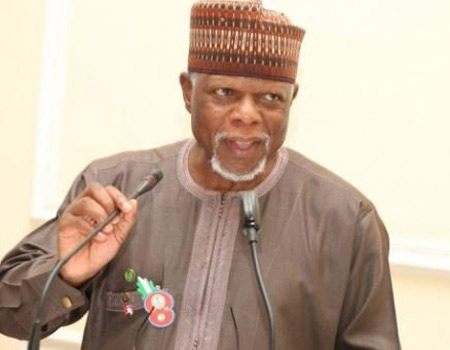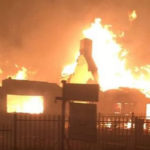
THE Nigerian Customs Service (NCS) has said that it was not aware of any fuel diversion that happened during the yuletide season.
Group Managing Director of the Nigerian National Petroleum Corporation (NNPC), Maikanti Baru, during an investigative public hearing by a Joint Senate and House of Representatives Committees on Petroleum Downstream, at the National Assembly Complex in Abuja had revealed that the nation lost about 148, 533, 000 million litres of fuel to diversion during the December fuel crisis in Nigeria.
Responding to enquiries on the issue by the Sunday Tribune, national spokesman of the NCS, Deputy Comptroller Joseph Attah explained that the Customs was part of the stakeholders that worked assiduously towards ending the fuel scarcity that rocked the nation during the yuletide period.
According to Attah, “Customs was part of the stakeholders that sought ways on how to deal with the challenge of fuel scarcity in the country. And one of the efforts we put in place was tightening access in and out of the nation’s borders.
“Talking about some truckloads of fuel disappearing, sincerely, I don’t know about that; because we are part of the stakeholders attending meetings and seeking ways of dealing with the fuel scarcity challenge, and our role was focused on strengthening the anti-smuggling operations at the border to ensure that nothing like that happens.”
Also speaking to Sunday Tribune on the fuel diversion claim, the spokesman of the Seme Border Command of the Customs Service, Taupyen Selchang explained that there “is no fuel diversion happening in Seme border.”
“We don’t have anything like that happening in Seme border area, because we have a team that monitors anything concerning petrol. The team ensures nothing like fuel diversion happens at Seme border.
“We at Seme Command of Customs ensure strict compliance to the laws of the country. And knowing the challenge the country went through during the Yuletide season, no sane Customs official would allow any petrol product to be smuggled out of the country.
“No sane Customs Area Command located along our borders will allow petrol products exit our country when the nation was suffering from lack of availability of the same product during the Yuletide season,” he said.
Meanwhile, a week into the new year, the Customs Service has expressed its determination and readiness to exceed its 2017 performance of its revenue generation in 2018.
The Customs, for the first time in its history, collected generated N1,012,259,006,779.74 to the government’s coffers in 2017, making it the highest revenue ever collected by the Service.
The revenue collected surpassed the N770,573,730,490 target given to the Customs by the government for 2017 by N241,685,276,289.74, and well above the N898,673,857,431.07 it collected in 2016.
Speaking with journalists in Abuja on Friday, the Customs’ spokesman, Mr Attah, stated that apart from the revenue collected on behalf of the government, the Customs played an active role in national security.
According to him, the Service reinvigorated its anti-smuggling operations in 2017, which yielded positive results as a total of 4,492 assorted seizures with a Duty Paid Value (DPV) of N12.78 billion was made.
Attah informed that the seizures included the 2,671 pump action riffles illegally imported into the country from Turkey; dangerous drugs; vehicles and rice, among others.
He further informed that a total of 207 suspects were arrested in connection with these seizures.
He noted that given the supports the NCS received from the Federal Government in 2017, the Service was poised to perform well this year.
According to the Customs imagemaker, the supports will translate to equipment, as well as more patrol vehicles to aid to enhance its performance in the new year.
“We are prepared to do more of what we did last year and we look forward to breaking the record of 2017 in 2018 by God grace,” Attah declared.
He then solicited the support of Nigerians with a view to assisting the Service in its determination to break the record the Customs set last year in terms of performance.
The PRO, however, frowned at the report in some national dailies insinuating a lingering feud between the NCS and the National Assembly.
He stated that the report emanated from the press conference he held in Lagos last Thursday and emphatically declared that the relationship between the Customs and the National Assembly was very cordial.
“For avoidance of doubt, we want to say that the relationship between the NCS and the National Assembly is cordial.
“There is no problem and we have no reason to blame the respected body for what is generally accepted as a very good performance in 2017.
“How do we (Customs) blame an individual or an organisation when many are commending the Service for a job well done in terms of revenue collection and suppression of smuggling?,” he stated.
Attah added that, “we are not reporting something negative; we are reporting something positive. Does it make sense to blame somebody for performing very well.”
Speaking at an investigative public hearing by a Joint Senate and House of Representatives Committees on Petroleum Downstream, at the National Assembly Complex, Abuja, Baru disclosed that during the period, NNPC could not track the movement of 4,501 trucks representing the quantity of the disappeared products.
“Due to massive diversion, hoarding, panic buying and smuggling, coupled with the information that three Direct Sales Direct Purchase Consortia had rejected October cargoes, there was insinuation of a supply gap,” he said.
Making an elaborate presentation to the joint committee investigating the fuel crisis in the country, the NNPC boss revealed that during the period under review, the Corporation was unable to track through its Aquilla tracking scheme the whereabouts of the affected trucks thus concluding that the products were diverted.
Baru listed some of the key factors which were responsible for the crisis to include insufficient reserve, clearance speed, supply gap, diversion, hoarding, panic buying and smuggling.
WATCH TOP VIDEOS FROM NIGERIAN TRIBUNE TV
- Relationship Hangout: Public vs Private Proposals – Which Truly Wins in Love?
- “No” Is a Complete Sentence: Why You Should Stop Feeling Guilty
- Relationship Hangout: Friendship Talk 2025 – How to Be a Good Friend & Big Questions on Friendship
- Police Overpower Armed Robbers in Ibadan After Fierce Struggle






